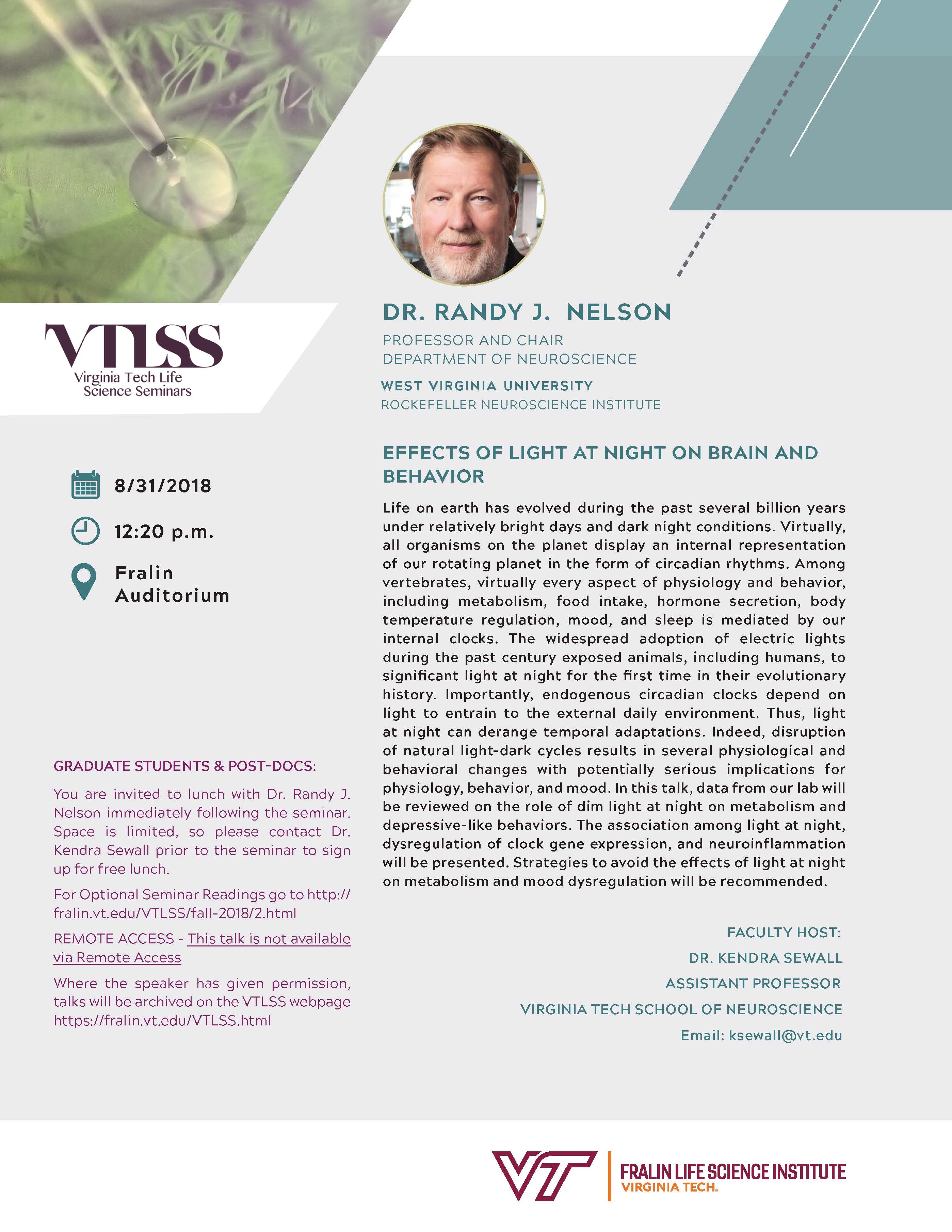Effects of Light at Night on Brain and Behavior

Dr. Randy Nelson
August 31 at 12:20pm in the Fralin Auditorium, Fralin Hall room 102
Hosted by Kendra Sewell
Randy J. Nelson currently holds the Hazel Ruby McQuain Chair for Neurological Research and serves as the inaugural chair of the Department of Neuroscience at the WVU School of Medicine. He is also Director of Research in the WVU Rockefeller Neuroscience Institute, and Director of the Neuroscience Graduate Program. He recently moved to WVU after serving as a Distinguished University Professor and the Brumbaugh Chair in Brain Research and Teaching at The Ohio State University, where he was Professor and Chair of the Department of Neuroscience. Dr. Nelson served on the faculty at The Johns Hopkins University for fifteen years prior to moving to OSU. Dr. Nelson earned his A.B. degree in Psychology at the University of California, Berkeley. He simultaneously earned a Ph.D. in Psychology and a Ph.D. in Endocrinology from the University of California, Berkeley, then went on to complete a postdoctoral fellowship in reproductive physiology at the University of Texas, Austin. He has published over 400 research articles and 11 books, including Introduction to Behavioral Endocrinology, an internationally recognized textbook. His research spans work on biological rhythms, sleep, behavioral endocrinology, and immune function. His current research focuses on the role of light at night in disrupting circadian organization of hormones, brain, and behavior.
Life on earth has evolved during the past several billion years under relatively bright days and dark night conditions. Virtually, all organisms on the planet display an internal representation of our rotating planet in the form of circadian rhythms. Among vertebrates, virtually every aspect of physiology and behavior, including metabolism, food intake, hormone secretion, body temperature regulation, mood, and sleep is mediated by our internal clocks. The widespread adoption of electric lights during the past century exposed animals, including humans, to significant light at night for the first time in their evolutionary history. Importantly, endogenous circadian clocks depend on light to entrain to the external daily environment. Thus, light at night can derange temporal adaptations. Indeed, disruption of natural light-dark cycles results in several physiological and behavioral changes with potentially serious implications for physiology, behavior, and mood. In this talk, data from our lab will be reviewed on the role of dim light at night on metabolism and depressive-like behaviors. The association among light at night, dysregulation of clock gene expression, and neuroinflammation will be presented. Strategies to avoid the effects of light at night on metabolism and mood dysregulation will be recommended.
Bedrosian, T.A. & Nelson, R.J. 2013. Influence of the modern light environment on mood. Molecular Psychiatry, 18:751-757. PM23711982.
Fonken, L.K. & Nelson, R.J. 2014. The effects of light at night on circadian clocks and metabolism.
Endocrine Reviews, 35:648-670. PMID24673196.
Dominoni DM, Borniger JC, Nelson RJ. 2016. Light at night, clocks and health: From humans to wild organisms. Biology Letters, 12: 20160015. PM26888917.

This seminar will NOT be livestreamed or recorded.


